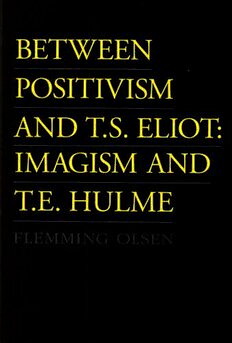
Between Positivism and T.S. Eliot: Imagism and T.E. Hulme PDF
195 Pages·2008·0.642 MB·English
Most books are stored in the elastic cloud where traffic is expensive. For this reason, we have a limit on daily download.
Preview Between Positivism and T.S. Eliot: Imagism and T.E. Hulme
Description:
Several critics have been intrigued by the gap between late Victorian poetry and the more 'modern' poetry of the 1920s. This book attempts to get to grips with the watershed by analysing one school of poetry and criticism written in the first decade of the 20th century until the end of the First World War. To many readers and critics, T.E. Hulme and the Imagists represent little more than a footnote. But they are more than mere stepping-stones in the transition. Besides being experimenting poets, most of them are acute critics of art and literature, and they made the poetic picture the focus of their attention. They are opposed not only to the monopoly of science, which claimed to be able to decide what truth and reality 'really' are, but also to the predictability and insipidity of much of the poetry of the late Tennyson and his successors. Behind the discussions and experiments lay the great question What Is Reality? What are its characteristics? How can we describe it? Can we ever get to an understanding of it? Hulme and the Imagists deserve to be taken seriously because of their untiring efforts, and because they contributed to bringing about the reorientation that took place within the poetical and critical traditions.
See more
The list of books you might like
Most books are stored in the elastic cloud where traffic is expensive. For this reason, we have a limit on daily download.
